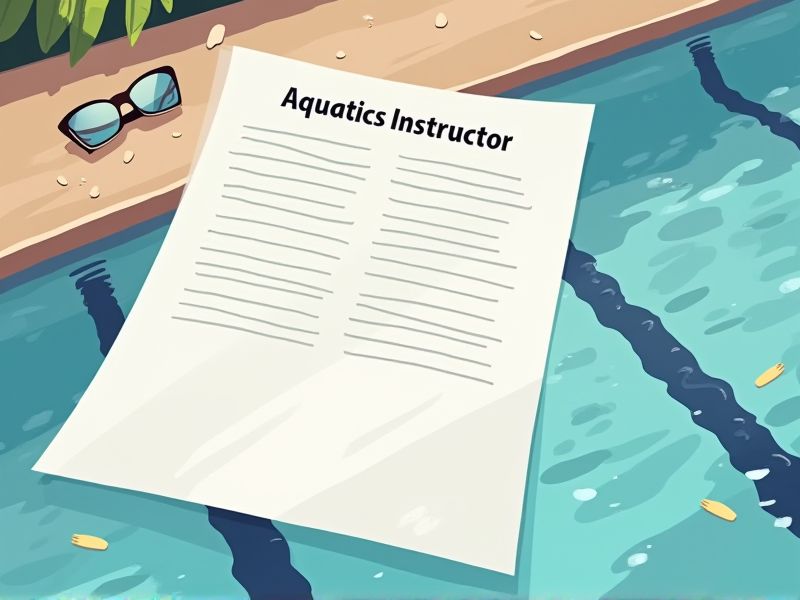
Aquatics Instructors are responsible for ensuring safety in water environments, which often involves life-saving skills. Proper training and certification validate an instructor's ability to handle emergencies and provide effective instruction. Regulatory bodies and aquatic facilities mandate certifications to maintain consistent safety standards and instructional quality. Here are some important certifications you may need as an Aquatics Instructor.
American Red Cross Lifeguard Certification
Obtaining the American Red Cross Lifeguard Certification ensures that aquatics instructors are adept at responding to emergency situations with appropriate life-saving techniques. This certification provides a standardized level of training, which helps maintain safety protocols across different facilities. With proper certification, instructors are more equipped to prevent drowning incidents and handle potential aquatic risks effectively. Facilities require certified personnel to meet legal and operational safety standards, ultimately enhancing trust among participants and their families.
American Red Cross Water Safety Instructor (WSI) Certification
The American Red Cross Water Safety Instructor (WSI) Certification equips instructors with essential skills to effectively teach water safety and swimming techniques, ensuring a higher standard of competence. This certification validates that instructors are trained in recognizing and responding to aquatic emergencies, crucial for maintaining a safe swimming environment. Employers often prefer or require the WSI Certification as it signifies adherence to nationally recognized safety and instructional protocols. Having the certification enhances the instructor's credibility, potentially leading to increased job opportunities and career advancement in the aquatics field.
American Red Cross CPR/AED Certification for the Professional Rescuer
An Aquatics Instructor deals with potential water-related emergencies, making CPR/AED certification essential to effectively respond to incidents like drowning. The American Red Cross certification provides standardized skills and knowledge necessary for immediate intervention, reducing the severity of injuries or fatalities. Employers prioritize safety, expecting instructors to be prepared for emergencies, which increases their hiring competitiveness. Implementing certified skills ensures adherence to legal and safety standards, fostering trust among participants and guardians.
American Red Cross First Aid Certification
The American Red Cross First Aid Certification is crucial for aquatics instructors because it equips them with essential life-saving skills needed during emergencies in aquatic settings. Instructors are more likely to encounter situations involving injuries or distress, and this certification provides the necessary training to respond effectively. Aquatics environments pose unique risks such as drowning or slips, requiring specific first aid techniques that the certification covers comprehensively. Compliance with safety regulations and institutional requirements often mandates having such certification to ensure a safe instructional environment.
YMCA Aquatic Lifeguard Certification
The YMCA Aquatic Lifeguard Certification is essential because it equips instructors with crucial skills for emergency response in aquatic settings, ensuring a safe environment for participants. Having this certification verifies that instructors can effectively perform rescues and administer basic first aid and CPR, which are vital in maintaining participant safety. This certification demonstrates a standardized level of competency recognized across various aquatic facilities, enhancing instructor credibility and job opportunities. The certification supports the YMCA's commitment to safety and quality in its aquatics programs, aligning with national standards.
Pool Operator Certification
Pool operator certification equips aquatics instructors with essential knowledge to maintain water chemistry and ensure swimmer safety. Knowledge of pool maintenance reduces the risk of waterborne illnesses and accidents, which can occur due to improper chemical balance or equipment failure. Certified pools can lead to higher trust among patrons, as they reflect a commitment to professional standards and safety. Regulatory compliance often requires certification for those responsible for the operation and management of aquatic facilities, underscoring its necessity.
American Lifeguard Association (ALA) Certification
The American Lifeguard Association (ALA) Certification ensures that aquatics instructors possess the necessary skills to handle water-related emergencies, reducing the risk of accidents. It demonstrates a standardized level of competence, increasing trust and credibility among employers and clients. The certification includes training in first aid and CPR, equipping instructors to respond efficiently to various health emergencies. Many aquatic facilities require ALA Certification as part of their hiring criteria to maintain compliance with safety regulations.
Emergency First Responder Certification
An Emergency First Responder Certification equips an aquatics instructor with essential lifesaving skills, ensuring quick and effective action during emergencies in or near water. Accidents in aquatic environments can escalate rapidly, making immediate response crucial to mitigate risk and prevent fatalities. Having this certification enhances the instructor's credibility and trustworthiness among participants and their families, which promotes a safer learning environment. Certification ensures that the instructor is well-prepared to handle a variety of health-related incidents, supporting overall safety protocols within aquatic facilities.
Basic Life Support (BLS) Certification
Basic Life Support (BLS) certification equips an aquatics instructor with essential skills to respond to emergencies like drowning or cardiac arrest, increasing the likelihood of saving lives. Employers often require BLS certification to ensure instructors can manage critical situations effectively and maintain a safe environment. Knowledge gained from BLS certification enhances an instructor's ability to provide immediate and efficient care before emergency medical services arrive. The training instills confidence not only in instructors but also in participants, fostering a secure and reassuring environment for all involved.
Aquatic Facility Management Certification
Possessing an Aquatic Facility Management Certification equips an aquatics instructor with critical skills in safety and risk management, leading to safer environments for participants. Certification ensures the instructor is knowledgeable about maintaining water quality, which directly affects participant health and comfort. This credential often becomes a requirement for employment, as it demonstrates a comprehensive understanding of facility operations and compliance with regulations. It also enhances the instructor's credibility, fostering trust among clients and employers, which can impact hiring decisions and customer satisfaction.
Summary
When you acquire certifications as an Aquatics Instructor, your credibility and skills increase significantly. As a result, potential employers and clients are more likely to trust your expertise, leading to increased job opportunities. Enhanced knowledge from certifications can also improve your teaching methods, providing better outcomes for your students. Ultimately, your professional growth facilitates wider career prospects and higher earning potential.
